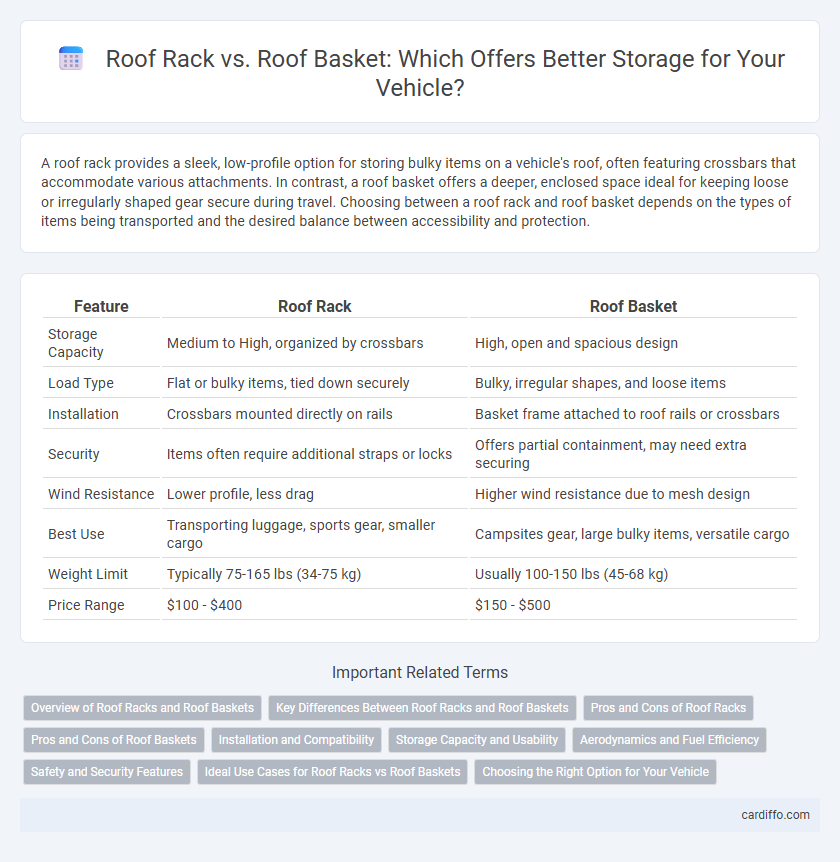A roof rack provides a sleek, low-profile option for storing bulky items on a vehicle's roof, often featuring crossbars that accommodate various attachments. In contrast, a roof basket offers a deeper, enclosed space ideal for keeping loose or irregularly shaped gear secure during travel. Choosing between a roof rack and roof basket depends on the types of items being transported and the desired balance between accessibility and protection.
Table of Comparison
| Feature | Roof Rack | Roof Basket |
|---|---|---|
| Storage Capacity | Medium to High, organized by crossbars | High, open and spacious design |
| Load Type | Flat or bulky items, tied down securely | Bulky, irregular shapes, and loose items |
| Installation | Crossbars mounted directly on rails | Basket frame attached to roof rails or crossbars |
| Security | Items often require additional straps or locks | Offers partial containment, may need extra securing |
| Wind Resistance | Lower profile, less drag | Higher wind resistance due to mesh design |
| Best Use | Transporting luggage, sports gear, smaller cargo | Campsites gear, large bulky items, versatile cargo |
| Weight Limit | Typically 75-165 lbs (34-75 kg) | Usually 100-150 lbs (45-68 kg) |
| Price Range | $100 - $400 | $150 - $500 |
Overview of Roof Racks and Roof Baskets
Roof racks provide a streamlined platform for securing items like kayaks, skis, or cargo boxes directly to a vehicle's roof, optimizing space without significantly increasing wind resistance. Roof baskets offer a more versatile open-frame design that accommodates irregularly shaped or bulky gear such as camping equipment or luggage, with side railings to prevent items from shifting during transit. Both storage solutions enhance vehicle capacity, but roof racks prioritize aerodynamic efficiency while roof baskets emphasize flexibility and cargo security.
Key Differences Between Roof Racks and Roof Baskets
Roof racks consist of crossbars mounted directly to a vehicle's roof, providing a sleek platform for securing various cargo types, while roof baskets offer a raised, enclosed framework that prevents smaller items from falling off during transit. Roof baskets typically have higher load capacity and better containment for irregularly shaped or loose gear, compared to roof racks that excel in versatility and aerodynamic efficiency. Key differences include installation methods, weight limits, and suitability for different cargo styles, influencing the choice based on transportation needs and vehicle compatibility.
Pros and Cons of Roof Racks
Roof racks offer a sleek, low-profile design that reduces wind resistance and noise, making them ideal for long trips and fuel efficiency. They provide versatile mounting options for various cargo types but often require specific mounts for bikes, kayaks, or skis, which can increase overall setup costs. Limited side and height capacity compared to roof baskets may restrict bulky or irregularly shaped items, impacting overall storage flexibility.
Pros and Cons of Roof Baskets
Roof baskets offer enhanced storage capacity for bulky items, providing a versatile and open framework that accommodates irregularly shaped cargo better than roof racks. They tend to be heavier and may create more wind resistance, impacting fuel efficiency and vehicle handling. However, their rugged design ensures durability and easier loading, making them ideal for off-road and adventure trips where securing large loads is essential.
Installation and Compatibility
Roof racks typically require precise mounting points on a vehicle's roof, making compatibility dependent on the car's existing factory rails or flush mounts. Roof baskets, designed with universal clamp systems, offer more flexible installation options suitable for various roof types without permanent modifications. Choosing between the two depends on vehicle roof structure and whether a fixed or adjustable storage solution is preferred.
Storage Capacity and Usability
Roof baskets offer greater storage capacity compared to roof racks, allowing for larger and bulkier items to be securely transported on vehicle roofs. Roof racks are ideal for organizing lighter and more streamlined cargo such as kayaks or luggage bags, providing versatile attachment points. The usability of roof baskets excels in stability and protection for loose or irregularly shaped goods, while roof racks prioritize aerodynamic design and ease of loading.
Aerodynamics and Fuel Efficiency
Roof racks typically offer better aerodynamics compared to roof baskets due to their streamlined design, which reduces wind resistance and drag. Lower drag coefficients contribute to improved fuel efficiency, especially at higher speeds or during long-distance travel. Choosing a roof rack over a roof basket can therefore lead to measurable fuel savings by optimizing airflow around the vehicle.
Safety and Security Features
Roof racks offer integrated locking mechanisms that secure cargo tightly, minimizing the risk of theft during transit. Roof baskets provide higher sidewalls and mesh flooring to prevent items from shifting or falling, enhancing load stability and safety. Both options incorporate durable, rust-resistant materials designed to withstand harsh weather conditions and maintain structural integrity.
Ideal Use Cases for Roof Racks vs Roof Baskets
Roof racks are ideal for securing large, flat items such as kayaks, skis, or luggage, offering a streamlined and aerodynamic solution for frequent travelers and outdoor enthusiasts. Roof baskets excel at carrying irregularly shaped or bulky cargo like camping gear, coolers, or construction materials, providing flexible storage with high load capacity and ease of access. Choosing between roof racks and roof baskets depends on the type of cargo and travel frequency, ensuring optimal storage efficiency and vehicle balance.
Choosing the Right Option for Your Vehicle
When selecting between a roof rack and a roof basket, consider your vehicle's specific storage needs and weight capacity. Roof racks offer a streamlined design ideal for carrying bikes or kayaks, while roof baskets provide versatile, open storage for bulky gear. Assess the compatibility with your vehicle's roof type and intended cargo to ensure optimal safety and efficiency.
roof rack vs roof basket Infographic

 cardiffo.com
cardiffo.com